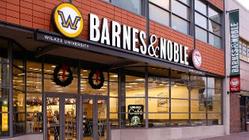 After several years of expectations fed by management that Barnes & Noble would spin off its Nook division together with its college bookstore operations, the company said yesterday that it will spin off just the college division, which will become a separate company known as Barnes & Noble Education. Nook operations will remain a part of B&N. In a tax-free transaction that should take place this summer, B&N shareholders will receive shares in the new company.
After several years of expectations fed by management that Barnes & Noble would spin off its Nook division together with its college bookstore operations, the company said yesterday that it will spin off just the college division, which will become a separate company known as Barnes & Noble Education. Nook operations will remain a part of B&N. In a tax-free transaction that should take place this summer, B&N shareholders will receive shares in the new company.
Investors liked the news: at four times the usual volume, yesterday B&N stock rose 6.9%, to $25.92, its highest level since 2009.
B&N said that "the separation will allow each business to optimize its strategic opportunities. As more focused companies with differing potential growth profiles, capital needs and market dynamics, each company will benefit from strategic clarity and separate management and Board focus. The separation will also allow investors to assess each business more clearly as a stand-alone company."
B&N CEO Michael P. Huseby added: "We have a talented College management team in place, led by CEO Max Roberts, and we will continue to invest and innovate to support the mission of our campus partners, expanding to new colleges and universities, students and faculty and increasing our presence in the growing market for digital educational content and services."
B&N Education operates 714 stores on college university campuses in the U.S., reaching about 23% of all American college-level students; its major competitors are Follett and NBC/Neebo, formerly known as Nebraska Book Company. The new company will retain its headquarters in Basking Ridge, N.J., and besides CEO Max J. Roberts, Patrick Maloney and Barry Brover will continue to serve as COO and CFO, respectively.
In the most recent full-year results, for the year ended May 3, sales of the college division were $1.7 billion. The college stores have represented about a third of B&N's sales.
The Wall Street Journal noted that the Nook division's continuing problems--including a 55% drop in sales during the holiday season--made the unit unattractive to a potential buyer and investors.
John Tinker, an analyst at Maxim Group, told the Journal: "What this does is create a pure play for investors interested in the college market. Keeping the Nook inside the retail group is logical because they don't currently know where it stands. Nook losses are shrinking, but it is still uncertain what’s really happening there."
The spinoff continues a long Barnes & Noble tradition of frequently buying and selling pieces of itself. The college bookstore operations is one example: once a separate company owned by longtime B&N chairman Len Riggio, Barnes & Noble College was bought by B&N, whose single-largest shareholder is Len Riggio, in 2009 for $514 million. That purchase led to lawsuits by B&N shareholders who charged that Riggio reaped excessive benefits from the transaction. In 2012, he agreed to a $29 million settlement.

